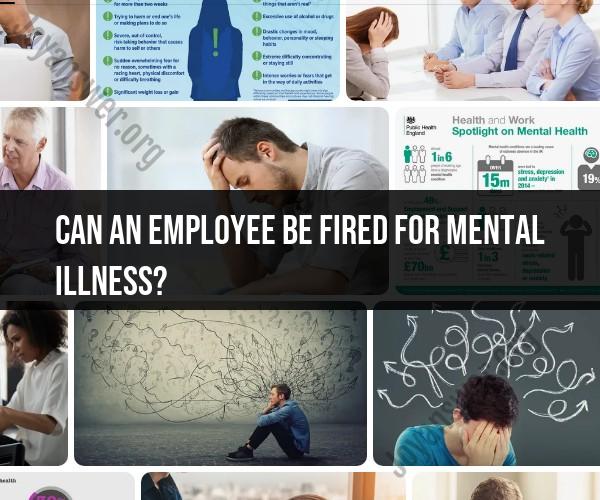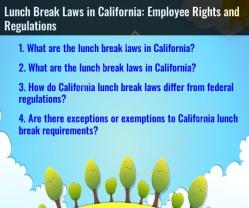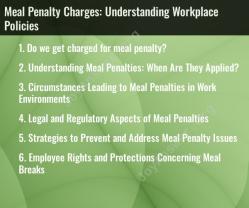Can an employee be fired for mental illness?
In many countries, including the United States, it is generally illegal to terminate an employee solely because they have a mental illness. Employment laws often protect individuals with mental health conditions from discrimination and wrongful termination. Here are key points to understand about the legal landscape related to employee termination and mental illness:
Anti-Discrimination Laws: Many countries, including the U.S., have laws that prohibit discrimination in the workplace based on disability, including mental health conditions. In the U.S., the Americans with Disabilities Act (ADA) and the Rehabilitation Act of 1973 protect individuals with disabilities, including those with mental illnesses, from discrimination.
Reasonable Accommodations: Under anti-discrimination laws, employers are often required to provide reasonable accommodations to employees with disabilities, including mental health conditions. These accommodations might include adjusted work hours, modified job duties, or extended leave for treatment.
Performance and Conduct: Employers have the right to address performance and conduct issues, regardless of whether they are related to a mental health condition. If an employee's performance or behavior does not meet job requirements or if they violate workplace policies, the employer can address those issues.
Communication and Documentation: Employers should maintain open communication with employees regarding performance concerns and offer support. Proper documentation of performance or conduct issues is essential to demonstrate that any termination is based on legitimate reasons unrelated to the individual's mental health.
Medical Privacy: An employee's medical information, including mental health diagnoses, is typically protected by privacy laws. Employers should not inquire about an employee's mental health condition unless the information is relevant to the job and necessary for accommodation purposes.
Seek Legal Advice: If you believe you have been terminated or discriminated against because of your mental illness, it's important to seek legal advice. An attorney with expertise in employment law can help you understand your rights and options.
Employer Education: Employers should educate themselves and their staff about mental health issues, stigmatization, and the legal obligations related to disability discrimination. Encouraging a supportive and inclusive workplace culture is beneficial for all employees.
It's important to note that employment laws can vary from country to country and may be subject to changes over time. Additionally, specific cases can be complex and may depend on individual circumstances. If you or someone you know is facing employment issues related to mental illness, consulting with a legal professional who specializes in employment law is advisable to navigate the legal landscape effectively.
Can an employee be terminated due to mental illness?
Yes, an employee can be terminated due to mental illness, but only if the mental illness substantially limits a major life activity and the employee is unable to perform the essential functions of their job, even with reasonable accommodations.
What are the legal protections and limitations regarding employment and mental health?
The Americans with Disabilities Act (ADA) protects employees with mental disabilities from discrimination in the workplace. This includes discrimination in hiring, firing, promotions, and other terms and conditions of employment.
Under the ADA, employers are required to provide reasonable accommodations to employees with mental disabilities, unless doing so would cause an undue hardship to the employer. Reasonable accommodations can include things like flexible work hours, changes in work duties, and time off for medical appointments.
Can employers terminate employees with mental illness under certain circumstances?
Yes, employers can terminate employees with mental illness under certain circumstances. For example, an employer can terminate an employee with mental illness if:
- The employee is unable to perform the essential functions of their job, even with reasonable accommodations.
- The employee poses a direct threat to the safety of themselves or others.
- The employee is violating a legitimate workplace policy, such as a workplace safety policy or a policy prohibiting discrimination.
How to advocate for your rights and seek legal recourse if wrongfully terminated?
If you are wrongfully terminated due to mental illness, you have the right to seek legal recourse. You can file a complaint with the Equal Employment Opportunity Commission (EEOC) or you can file a lawsuit in federal court.
If you decide to file a complaint with the EEOC, the EEOC will investigate your complaint and try to resolve the matter through mediation or conciliation. If the EEOC is unable to resolve the matter, you will have the right to file a lawsuit in federal court.
If you decide to file a lawsuit in federal court, you will need to hire an attorney. An attorney can help you file your lawsuit and represent you in court.
What policies and resources are in place to address employment discrimination related to mental health?
There are a number of policies and resources in place to address employment discrimination related to mental health.
The ADA requires employers to provide reasonable accommodations to employees with mental disabilities. This means that employers must make changes to the workplace or job duties to allow employees with mental disabilities to perform their jobs.
There are also a number of laws that protect employees from discrimination based on specific mental health conditions, such as depression and anxiety. For example, the Family and Medical Leave Act (FMLA) allows employees to take unpaid leave for medical reasons, including mental health reasons.
If you have a mental health condition and you are concerned about discrimination at work, you should talk to your employer or a human resources representative. You can also contact the EEOC or a legal aid organization for more information.
It is important to remember that you have rights and that you are not alone. There are people who can help you if you are experiencing employment discrimination related to mental health.












